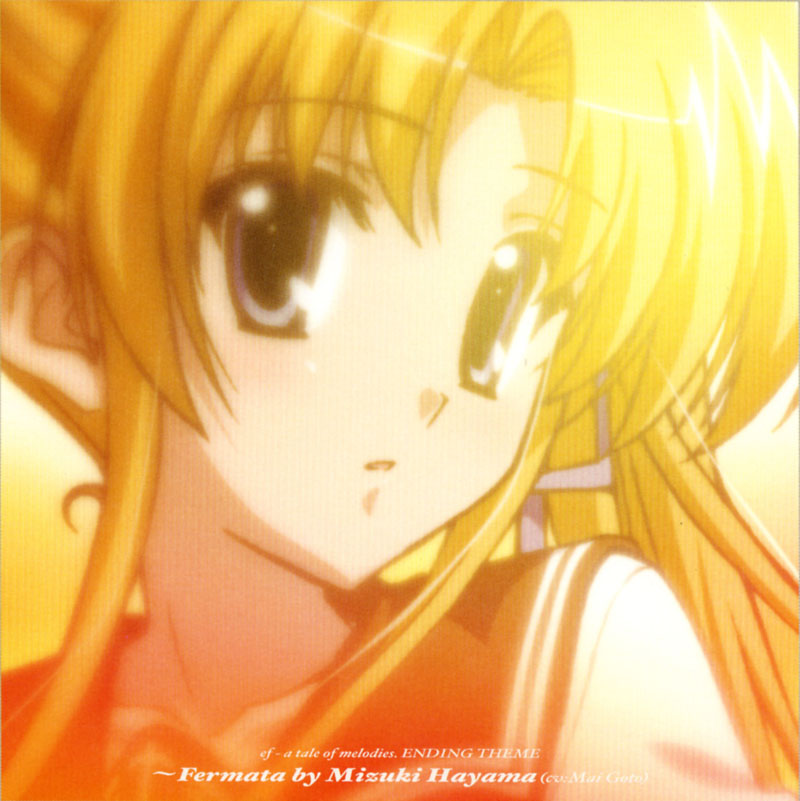ef – a tale of melodies ED Single – Fermata by Mizuki Hayama – Review
| Album Title: | Fermata by Mizuki Hayama (cv: Mai Goto) |
|---|---|
| Anime Title: | ef – a tale of melodies |
| Artist: | Mai Goto; Eiichiro Yanagi; Tenmon |
| Catalog Number: | GNCA-0124 |
| Release Type: | OP/ED Single |
| Release Date: | Nov 05, 2008 |
| Track Title | Artist | Time |
|---|---|---|
| 1. Egao no Chikara / Strength of Smiles | Mai Goto | 4:34 |
| 2. ebullient future (Mizuki ver.) | Mai Goto | 3:38 |
| 3. Egao no Chikara / Strength of Smiles (Re-mix ver.) | Mai Goto | 3:59 |
| 4. Egao no Chikara / Strength of Smiles (INST) | Eiichiro Yanagi | 4:30 |
Review: Fermata is one of the more difficult albums to analyze because there are several factors within this album that force me to pause and think about it. On the one hand, “Egao no Chikara’s” melody is enjoyable but that comes in spite of Mai Goto, who isn’t exactly one of the more expressive singers out there. While a singer who doesn’t convey the wholeness of the emotions is problematic, somehow, her performance manages to fit the songs’ general atmosphere. So even though there are some issues with this album, it doesn’t change the fact that this album is worth checking out, especially if you’ve been following the series.
“Egao no Chikara’s” opening chords do a good job of grabbing at the listener’s attention and once it does that, the song takes a step back to bring in Goto’s soft and subdued introduction. The tone at this point is calm and mellow, and from the way she’s singing, it feels as though she’s drifting along in a dreamlike state as she’s searching for something precious. Maybe it’s companionship, because there is a feeling of loneliness that is pervasive throughout this song, though it does have a dash of optimism which becomes more apparent around 2:53 where the feeling generated is one of contentedness. Overall, this track is enjoyable, helped along by a catchy, if somewhat repetitive, melody and the manner in which the violins and guitars in the background augment the lonely mood. Mai Goto’s performance is adequate enough to get the general feeling across, and even if her delivery is a bit flat and unexpressive at times, it doesn’t adversely impact the song too much.
Next up is Mai Goto’s rendition of “ebullient future” and right off the bat, her voice and the accompanying piano set a slightly different tone from Elisa’s performance. The slow pacing creates a rather deliberate feel and when you factor in Goto’s voice, this rendition lacks the forcefulness of the original because Goto isn’t nearly as expressive as Elisa. However, one should keep in mind that this is Goto’s rendition of “ebullient future” and to expect a carbon copy of the original is to rob this song of its unique take which remains enjoyable all the same. Goto’s voice becomes the dominant force throughout this piece and the way the accompaniment and the harmony subtly complements her helps create a sense of loneliness. The lack of forcefulness removes the traces of bitterness that the original had, making it feel as though the singer is resigned to her fate. I’ll admit that I may just be reading a bit too much into the way Goto’s tone and inflections contribute to this feeling, but it’s an interesting thought nonetheless. Regardless of what the canonical interpretation of this performance turns out to be, it’s always interesting to see how a rendition of a song sung in a different way can create a different mood altogether. Goto might not be the most expressive singer out there, but her performance here is worthy of praise because of her own spin that she puts into this song.
It’s a shame then that this album couldn’t have ended with “ebullient future” because what we end with is a terrible remix of “Egao no Chikara.” While there were ways in which this song could have been rearranged, starting the song off with an annoying upbeat effect paired with an echoing vocal part is not a good way to go about it. The remix feels like an excuse to put in as many effects as they could and seeing just how much the listener can really tolerate because the remixers certainly didn’t skimp on the obnoxious effects like the echoes and empty, bubbly flourishes. The piano accompaniment and the percussion are both overly loud, which, when combined with the layer of flourishes, creates a rather grating effect. In short, this remix wasn’t put too well together and you’d be better off skipping this track altogether.
Bad remixes aside, this album certainly won’t breach anyone’s top 10 list, but at least it delivers a competent listening experience. The melodies are catchy without being overly repetitive and Mai Goto’s performance of “ebullient future” is definitely worth taking a look at because of the way one can interpret her rendition of it. If nothing else, this album provides a good insight into Mizuki’s thoughts and feelings and complements the series rather well.
Rating: Decent
Ending – Egao no Chikara

